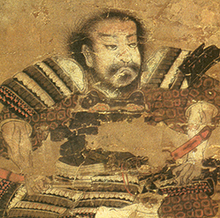Shibata Katsuie
This article needs additional citations for verification. (November 2006) |
Shibata Katsuie | |
|---|---|
 Shibata Katsuie | |
| Born | 1522 Owari Province |
| Died | June 14, 1583 Battle of Shizugatake, Echizen Province |
Template:Japanese name Shibata Katsuie (柴田 勝家, 1522 – June 14, 1583) or Gonroku (権六) was a Japanese samurai and military commander during the Sengoku Period.
He served Oda Nobunaga as one of his trusted generals, but was severely wounded in the 1571 Siege of Nagashima.[1]

Biography
Katsuie was born in the village of Kamiyashiro (present-day Meitō-ku, Nagoya), a branch of the Shiba clan (who descended from the Ashikaga clan, and were the former suzerains of the Oda clan). Note the differences between Shibata (柴田), Shiba (斯波), and the Shibata clan of Echigo (新発田).
Katsuie was the retainer of Oda Nobukatsu (Oda Nobuyuki). When control of the Oda clan was contested, Katsuie initially supported his lord, Nobukatsu, against his elder brother Oda Nobunaga. In 1556, Katsuie launched a coup d'etat against Nobunaga. He was defeated at the Battle of Inō, and in the aftermath Nobunaga had his brother executed, but impressed with the retainer's loyalty and bravery, spared the life of Katsuie. Katsuie pledged his services to Nobunaga, earning his praises. In 1570, while a joint Oda–Tokugawa coalition fought the Battle of Anegawa, Katsuie was under Siege of Chōkō-ji Castle by 4000 soldiers of the Rokkaku clan. Katsuie eventually won via an all-out attack, forcing the Rokkaku to retreat. This action, along with a series of brilliant victories, gained him renown as "Oni Shibata".
In 1575, after gaining control of Echizen, he took command of Kitanosho Castle (Hokujō) and was ordered to conquer the Hokuriku region. After controlling Kaga and Noto, he began a campaign against Etchū Province in 1581. In 1582, Nobunaga was betrayed at Honnō-ji by Akechi Mitsuhide and although Katsuie wanted to join the hunt for Akechi, he was unable to return south as he was heavily invested with the Siege of Matsukura and the army of Uesugi Kagekatsu.
In a meeting in Kiyosu to determine the successor to Nobunaga, he supported Oda Nobutaka, the third son, for whom Katsuie had performed the genpuku ritual. He allied with Oda Nobutaka and Takigawa Kazumasu to battle Hideyoshi. However, his domain was sealed off in the winter by snowfalls and this limited his ability. Both of his allies were defeated while Katsuie battled snowfalls and Uesugi. His forces, under the leadership of Sakuma Morimasa, besieged Nakagawa Kiyohide at Shizugatake in a move to turn the tide launching the battle of Shizugatake. Sakuma ignored Shibata's orders to merely test the enemy's defence and was destroyed by Toyotomi Hideyoshi's returning forces. He retreated to Kitanoshō castle but with the army destroyed, Katsuie had no option but to surrender. Katsuie committed seppuku and set the fire to the castle. He implored Oichi to take their daughters and leave, but she decided to follow his death, while letting her daughters escape.[2] Ironically, Katsuie had not so much as lifted a spear personally during the battle.
His death poem was:
- 夏の夜の 夢路儚き 後の名を 雲井にあげよ 山不如
- Natsu no yo no
- yumeji hakanaki
- ato no na o
- kumoi ni ageyo
- yamahototogisu
- "Fleeting dream paths, in the summer night! O bird of the mountain, carry my name beyond the clouds."
In popular culture
Shibata Katsuie is a playable character in Koei Tecmo's Samurai Warriors 2: Empires and all subsequent Samurai Warriors and Warriors Orochi games. He fights with a normal spear in Empires and twin axes in later games.
He is also a playable character in the game Sengoku Basara 4 for the PlayStation 3. He wears The Green Armor and uses a dual-sided spear.
See also
References
- ^ Turnbull, Stephen (2000). The Samurai Sourcebook. London: Cassell & C0. p. 221. ISBN 1854095234.
- ^ "Fukui Castle, Kitanosho Ruins". 2009-03-24. Retrieved 30 April 2009.
http://www.samurai-archives.com/katsuie.html
External links
This article incorporates text from OpenHistory.
